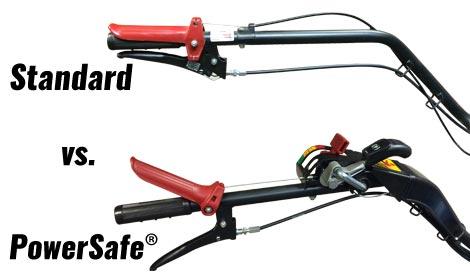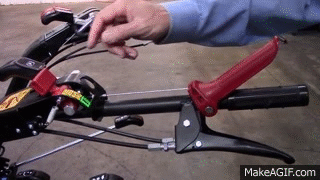
The PowerSafe models (739, 749 and 750) are more durable and safer than
the standard clutch models (710, 718, 722, 732, 852, 853, and 620). In fact, PowerSafe features are required in Europe to comply with safety standards.
The PowerSafe clutch is a patented design by the BCS factory that uses hydraulic pressure to compress multiple flat plates, rather than the spring-loaded double cone system featured on standard models. The other primary difference is that PowerSafe models do not have transport speeds.
Aside from these differences, the following PowerSafe and Standard models have many similarities:
739 = PowerSafe upgrade of model 732
- Differences: Honda GX340 engine (electric and recoil options) on model 739, Kohler CH395 engine (electric and recoil options) on model 732. Model 732’s third gear is a tranport speed while model 739 features a third working speed instead.
- Similarities: Differential Drive.
749 = PowerSafe equivalent of model 853/852
- Similarities: Honda GX390 engine (electric and recoil options), Differential Drive and individual steering brakes.
750 = PowerSafe equivalent of discontinued model 948
- Similarities: Honda GX390 engine (electric and recoil options), Differential Drive with Lockout, individual steering brakes, 6.5×12 wheels and 33” tiller compatibility.
Now, let’s discuss the PowerSafe clutch and how it relates to the standard clutch.
Benefits of PowerSafe include:
Safety. PowerSafe machines provide immediate stoppage when the Operator Presence Control (OPC) is released. The engine of Standard clutch machines typically sputter a bit after the red OPC lever is released, causing the wheels to rotate a turn or so before coming to a complete stop. By contrast, when the OPC lever is released on a PowerSafe model, the loss of hydraulic pressure results in an immediate stop.
Three Working Speeds. All PowerSafe models feature three working speeds. Particularly in the case of model 739, many operators find the third working speed more useful than the 732’s transport speed because it can be used to mow large areas in much less time. Please note that standard clutch models 852 and 853 are the only BCS tractors that feature a third working speed AND a transport speed.
Eliminates the “Stuck Clutch” Syndrome. The PowerSafe’s hydraulic “wet” clutch replaces the spring-loaded cone clutch, eliminating the risk of becoming frozen or “stuck” due to moisture bonding the cones together when left engaged (un-clipped). While the stuck standard clutch is completely avoidable if the owner is diligent about clipping the clutch lever during storage, PowerSafe removes the risk completely.
Durability. The PowerSafe clutch is more durable than the standard clutch—it can handle high torque loads for longer periods of time compared to cone clutches. The key is that PowerSafe clutches are cooled by circulating oil, instead of air.
Ease of Use. In addition to smoother shifting, the engine on PowerSafe machines continues to run even after the Operator Presence Control (red lever on left handlebar) is released. This is especially convenient when the operator is forced to stop immediately, must remove something from a mowing path, or wants to stop and chat. On standard clutches, the clutch needs to be clipped for the tractor to stop and the engine to continue running.
Warranty and Repair-ability. The PowerSafe clutch is longer-lasting, backed by a five-year warranty for ALL owners— homeowners, rental, and commercial. Standard clutches have a three-year non-commercial warranty and a one-year commercial warranty. Another advantage is “repair-ability”—PowerSafe clutches do not require complete replacement like standard clutches typically do when problems are encountered. To date, the most common repair on a PowerSafe clutch involves replacing a spring on the control valve (around $8 in spare parts). Many causes of standard clutch failure, including the clutch lining worn beyond its operational limit due to normal wear over time, requires complete replacement rather than repair ($250 – $300 for a replacement standard clutch).
Additional Features. PowerSafe machines feature a parking brake, convenient for parking on hillsides or when transporting in a truck or trailer. They also feature an engine kill switch on the left handlebar to shut off the engine. Both features are not included on a standard machine.

Benefits of Standard clutches include:
Less Maintenance. On PowerSafe tractors, the factory recommends that the transmission oil filter be replaced after the first 30 working hours. It’s also recommended that the transmission fluid and oil filter be changed every 100 hours OR once per year, whichever occurs first. The standard models do not have a transmission oil filter and use SAE 80/90 gear oil. Replacing the filter and oil is a simple procedure, but it’s been proven over time that standard models do not require an oil change as frequently—the BCS manual recommends “checking (the transmission oil) every 50 hours” (SEE THIS LINK, Page 26). Many standard tractor owners change the transmission oil once every two to three years with no problems.
Simpler Clutch Removal. The standard clutches are not complicated—two spring-loaded cones that are compressed during operation and separated during storage. If a standard clutch problem is encountered, it’s much easier to remove and replace the entire clutch, which means less labor cost. The PowerSafe clutch is a sophisticated, patented design and requires more mechanical knowledge to repair, likely needing a BCS dealer to assess and repair damaged clutches. With that said, the 5-year PowerSafe clutch warranty protects the owner from any potential factory-related defects.
Transport Speed. If you plan to use the BCS Utility Trailer or Transport Sulky, the transport speed is featured only on standard machines and can travel between 6 and 8 MPH. The Utility Trailer and Transport Sulky can still be operated on a PowerSafe machine, but there is no transport speed.
“Tried and True” Design. The double cone clutch has been used for more than 40 years, while the PowerSafe clutch was introduced in 2009. However, while it has not been in the field for as many decades as the standard double-cone clutch, PowerSafe has proven itself to have a longer, more productive life through extensive testing by the BCS factory and during these last seven years of use by thousands of customers.